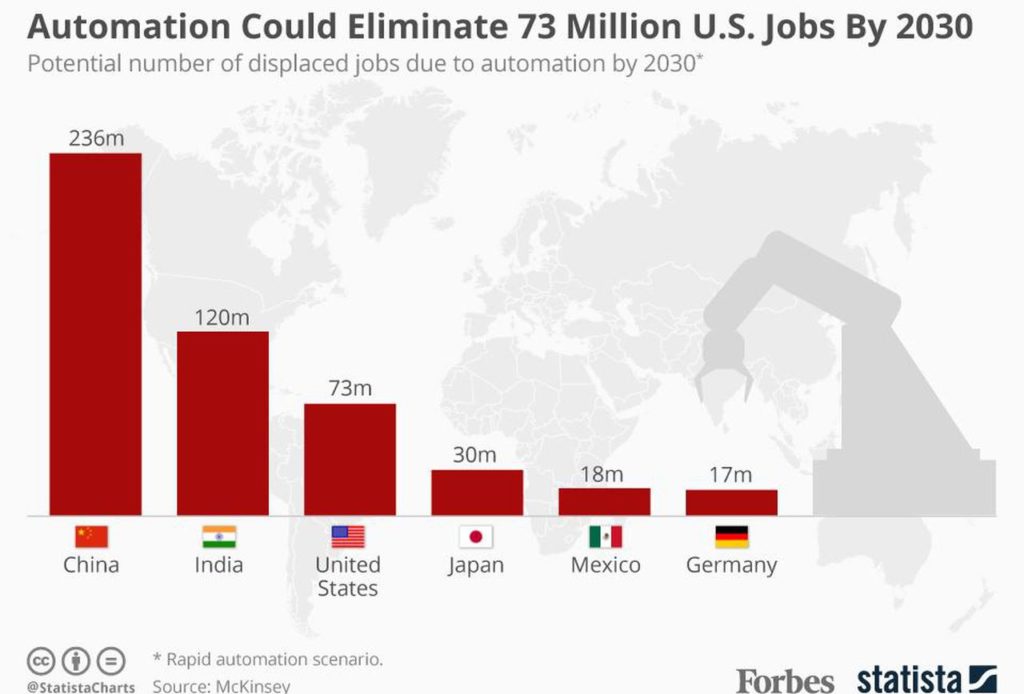Automation comes in a variety of forms, including physical and digital automation, and is not necessarily be good or evil. One thing, however, is certain that It will certainly have a huge impact on many peoples’ jobs and lives.
Many people who work in factories, for example, are seeing their jobs taken by machines who can do the job for lower pay. Since this is at no fault of the worker, it only seems right that there should be some type of compensation.
In this article, you’ll get a brief look at the history of the changing workplace and possible types of compensation for job loss due to automation.
The changing workplace
There is a narrative that automation in the workplace will result in mass unemployment and the economic downfall of many. And as the media will tell it, we are right on the precipice when it comes to major automation overhaul.
Compensation for job loss due to automation might manifest in a variety of ways. The traditional way, of course, is monetary compensation, which you would be encouraged to hire a workers compensation attorney for. For instance, if there are indeed more job losses related to automation, it will become a priority in society to bring social safety nets up to date.

This isn’t a new concept, just as automation isn’t a new concept. In fact, automation has been an important factor in changing employment laws all throughout the history of the United States and especially during the 20th century. consider how labour laws have adjusted in the past to societal changes, globalization and changes in technology:
- 1847: New Hampshire implements 10-hour-day law
- 1924: Abolishment of child labour
- 1935: Right to form a union
- 1938: Maximum 40-hour workweek
- 1962 and 1974: Trade adjustment assistance
- 1963: Equal Pay Act
- 1970: OSHA passed
So it may be that the next workplace evolution will be an adjustment, or compensation, to help workers deal with the rising use of automated technology. Some solutions may include universal basic income, or graduated wage insurance. This would include health insurance subsidies for those who lost their jobs or were forced to take lower-paying jobs due to automation.
Possible solutions and compensation
Automation certainly doesn’t have to mean less available work. Managers should take the initiative to bring new training programs to their employees.
Consider the following situation: Employees in a factory assemble parts to create a whole product. The factory introduces machines programmed to assemble the parts. These machines cut costs and increase output, earning the company more money, so the workers are laid off. A solution to this scenario that many companies are trying, is training the workers to be able to fix problems with the machines. Not only does this lead to new skills, but also in many cases, higher paychecks.
To that point, change in the job market due to technological advances may create job loss in the short term, but in the long term it could lead to exponentially more job opportunities. In fact, technology can complement labour, instead of just replacing it. Workers can become more productive, and can even benefit from more interesting and engaging jobs.
According to the Roosevelt Institute, some policy changes should be made in order to ensure economic growth, not just for CEOs but for workers at all levels of a company. These changes include:
- Free higher education: No matter your income level, you should have the opportunity to pursue vocational training after high school.
- Public guidance: The government plays a large role in the direction that innovation takes, through the funding of research and creating research agencies. When doing this, the government should make sure to fund research for technology that will complement workers, not substitute them.
- Full employment: The U.S. government should implement full employment, which would result in a tighter labour market, and in turn, decrease the negative effects that technology has on workers.
No one can predict exactly how automation will change the workplace, but one thing is sure: Automation will change the workplace. Compensation for this change is necessary for workers who have dedicated their futures to working in their industries. But automation may not only come in monetary form; it’s important to be open-minded to compensation in the form of learning new skills to work with automation and not against it.

